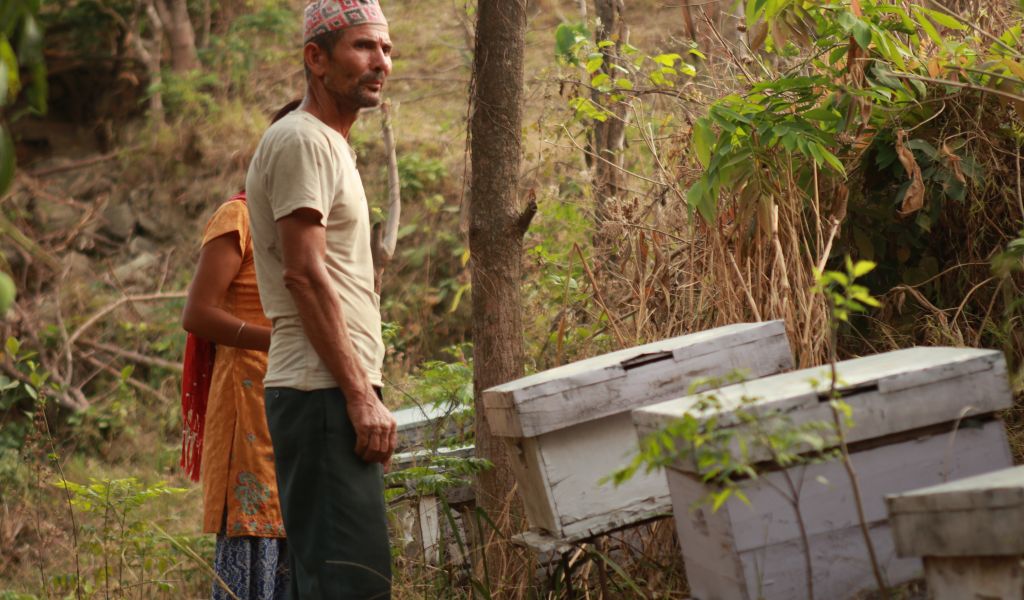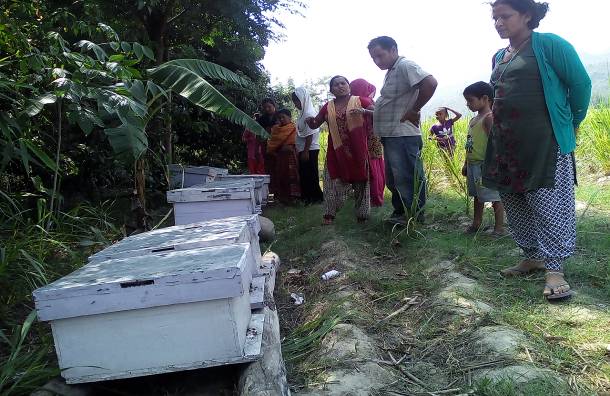Update on Trees and Bees Project!

The 'Trees and Bees' project has made significant progress since we last updated you. Almost all of the project’s activities have been implemented and women have already been able to harvest and sell honey at local markets. 
To date, the Trees and Bees project has distributed 37 beehives to eleven households in Bishnupur (22 beehives) and Pragatishil (15 beehives) Community Forestry User Groups (CFUGs), in Sarlahi district, Nepal.
In Pragatishil, five women have received three beehives each. The process to select these women was undertaken by the Pragatishil CFUG, who undertook an assessment of the existing capacities and knowledge of beekeeping amongst the women members. From this assessment, all 37 members of the community group decided who would receive the beehives. The recipients come from Dalit families; in the caste system Dalits occupy the lowest place, and are the most disadvantaged.
In Bishnupur, six women have received 22 beehives. Over the past six months the women have already harvested honey from the bees on three occasions, averaging five kilograms per harvest, which has been sold at a nearby market in Lalbandi. Currently, one beehive can produce up to 18 kilograms of honey in a year. This honey is sold for around five US dollars per kilogram. One family has already received around 270 US dollars from three hives.
“I have harvested 45 kilograms of honey in nine months from three beehives and sold the honey in my village. I found beekeeping is a low input and high income enterprise, and provides regular income. This is good for poor families”, says Mausami Upreti from the Bishnupur women’s CFUG.
The project has diversified rural incomes and has already facilitated two women to move from being full time laborers in the local market to bee entrepreneurs.
 In Pragatishil, the women have been unable to harvest honey due to ongoing drought and then later flash flooding. The lack of rain has meant that that there has not been enough food for the bees, and the local trainer advised that artificial feed is not healthy for new hives. Still, the women are looking forward to their first harvest. “I have observed from other villages that there is a good market for honey and the possibility to profit with few inputs. I am expecting that within a few months I will get a good harvest and return from the honey, which I can spend on my children’s education”, confers Dhanamaya BK, Pragatisil women’s CFUG.
In Pragatishil, the women have been unable to harvest honey due to ongoing drought and then later flash flooding. The lack of rain has meant that that there has not been enough food for the bees, and the local trainer advised that artificial feed is not healthy for new hives. Still, the women are looking forward to their first harvest. “I have observed from other villages that there is a good market for honey and the possibility to profit with few inputs. I am expecting that within a few months I will get a good harvest and return from the honey, which I can spend on my children’s education”, confers Dhanamaya BK, Pragatisil women’s CFUG.
As well as hives, the eleven families have received the tools needed for beekeeping and harvesting.
The project has provided training on beekeeping and harvesting techniques to ensure that the new bee entrepreneurs have the knowledge and skills they need to generate income from the beehives. Two trainings were held in Bishnupur and one in Pragatishil. The trainings covered beehive maintenance and health, bee identification, feeding colonies, ensuring protection from foreign insects, and honey collection.
Two trainings over two days were held in Bishnupur, provided to six households, whilst one two day training was held in Pragatishil for five households. All trainings were attended by the husband and wife of the eleven households from respective communities.

The project has overseen the distribution of 546 mango, lychee and jack fruit trees in Bishnupur and Pragatishil. While this activity was delayed due to a lack of rain, all distributed trees have now been planted.
Bishnu Mahat, from the Bishnupur women’s CFUG, reports that, “instead of planting sugarcane, I have started planting mango on my land. Sugarcane uses too much water and is drying the land, whilst reducing productivity. I am expecting that mango will provide a better return than sugarcane and will diversify my income source.”
Similarly, in Pragatishil Harimaya BK says, “we have planted lychee and mango in our home garden and they will provide a good harvest after 5-6 years. We can consume some of the fruit at home and we can sell the rest to generate income. It will be a long-term source of income, which will benefit me in my old age as well as my children.”
On top of this, the project has also overseen the distribution and sowing of 900 pointed gourd cuttings. The cuttings were provided to 32 families in Pragatishil. Activities still need to be implemented in Bishnupur.
“I am making money out of vegetables grown on my small piece of land”, says Indira Phuyal, Pragatishil women’s CFUG. However, she has concerns about fluctuations in market prices.
In Pragatishil, a total of 2,000 grass slips of fodder species have been planted. On top of this, the project has planted just under 300 fodder trees and 150 bamboo rhizomes. In Bishnupur, the community has planted 200 bamboo rhizomes and over 4000 fodder trees and grass slips.
The women will receive support for the full year to ensure the success of the project and the women’s ability to generate income and enhance their livelihoods. A contract has been established with the beehive provider to fulfill this service.
The project will move from strength to strength as the CFUGs have outlined ways to ensure the sustainability of the project and build on its success. Each of the families that have received a bee hive will split their hive at the end of the year to provide a hive for another family; the CFUG’s are continuing to plant tree seedlings each year; and plans to scale-up vegetable cultivation have already seen an increase of area under cultivation from six to nine kattha (1 kattha = 720 square feet).
After months of work, almost all of the project's activities have been implemented. Of the 45 hives originally planned for distribution, there remains another eight to be distributed. Similarly, only 546 of the 750 fruit trees have been distributed and planted. By December, the project staff plan to conduct a reflection workshop with the communities on the lessons and successes of the project, identify women to receive the remaining eight beehives, distribute the beehives and provide beekeeping training. The remaining trees must wait until the next rainy season to be planted.
 Thank you for your support! We hope that this provides you with some insight into the transformation your donation has helped women and their communities in Pragatishil and Bishnupur to achieve.
Thank you for your support! We hope that this provides you with some insight into the transformation your donation has helped women and their communities in Pragatishil and Bishnupur to achieve.

